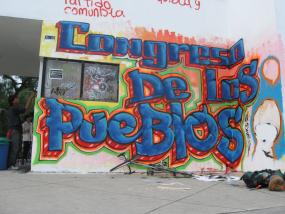In what has been referred to as the conflict’s other agenda, the Colombian government, led by Juan Manuel, Santos, has begun a bloody persecution against popular organizations using security and military groups. At the same time, in a clear collaboration with this strategy, semi-official forces are assassinating and displacing hundreds of Colombians in many areas of the country.
According to the Cumbre Agrario y Popular, during the massive National Agrarian Strike, “the governmental repression left a devastating balance, which includes the loss of 12 human lives, four kidnapped, persons, 660 cases of individual and collective human rights violations in the entire country, 262 unwarranted arrests, 485 injured people, 21 people injured by firearms, 52 cases of harassment and threats against the strikers and social leaders and 51 cases of indiscriminating attacks on the civil public in different regions of the country.
While in full negotiations about the strikes’ processes, the human rights violations have continued. Examples of such cases are provided below:
- September 8: Marleny Benitez and Felipe Triana, who reclaimed land in Apartado, were threatened.
- September 17: Nelson Girlado Posada, director of the movement for those affected by the construction of HidroItuango was assassinated in Ituango.
- September 27: Raúl Perdomo Pimentel, affiliate of the Syndicate Workers Union (USO) was assassinated in Putomayo. That same day, while discussion developed between the spokesmen of the mobilized communities in Aguachica and the national government, agents of the intelligence service, such as the paramilitary, were found at the site in question commenting openly that their objective was to assassinate Teófilo Acuna and Narciso Beleño.
- October 1: 36-year-old and mother of three, Adelinda Govez Gaviria was assassinated. Gaviria was a defender of human rights and rural leader who was opposed to the miner megaprojects in the Cauca Department.
These cases touch on a variety of ideas, but the most important to take away is that they are actions against leaders and movements that are fighting against the national government’s extractive model and their “engine of progress.”
Moreover, they send a clear message: there is no desire on behalf of the government, nor on behalf of the powers they represent (landowners and transnational corporations) to resolve the issue of land and mining/energy.
As the towns are on the verge of beginning a new period of struggle, many are alert, convening from the upcoming week of October, seeing as the right to protest is not guaranteed in Colombia; instead the order of the day is the agenda against legitimate popular expressions.
We find solidarity with the social movements whose leaders have been forced out and we call to strengthen the processes of unity and to fight for a life of dignity, sovereignty, and permanence in our rural and urban territories.
Comisión de Comunicaciones - Congreso de los Pueblos
Comisión de DDHH - Congreso de los Pueblos
